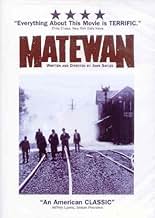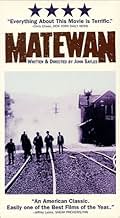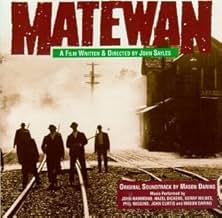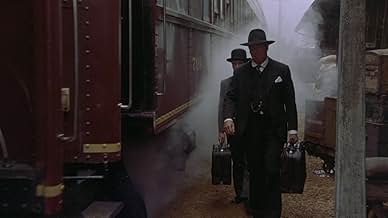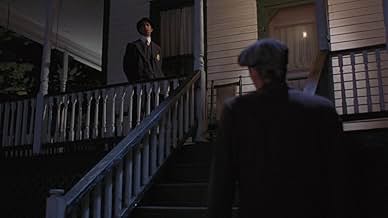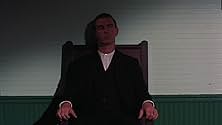अपनी भाषा में प्लॉट जोड़ेंA labor union organizer comes to an embattled mining community in 1920 West Virginia, brutally and violently dominated and harassed by the mining company.A labor union organizer comes to an embattled mining community in 1920 West Virginia, brutally and violently dominated and harassed by the mining company.A labor union organizer comes to an embattled mining community in 1920 West Virginia, brutally and violently dominated and harassed by the mining company.
- 1 ऑस्कर के लिए नामांकित
- 3 जीत और कुल 8 नामांकन
- Ellix
- (as Michael Preston)
फ़ीचर्ड समीक्षाएं
What a lovely world he creates here, among the derelict shacks and cabins of the Pennsylvania foothills of Matewan a moral struggle is fought, flawed characters with faces blackened by coaldust fumble with great ideals and big hopes for a better future, and the one thing that stands between them and justice is their own prejudice. I like how the film suggests that for the collective to be reformed the individual must be reformed first, that we need to look inwards first before we make a stand. The stand in the film is heroic but also desperate, a bit of a lawless old West on the way to emancipation. John Sayles is a leftist and this comes across loud and clear in Matewan, but unlike a Godard film like Week End, Sayles doesn't call for blood, he calls for social justice.
The narrative here sprawls in and out of log cabins where sullen faces plot strikes and discuss ideals, in and out of makeshift tents and muddy town streets where coalminers live and die and sing, now a fiddle or harmonica is calling out from the dark the sad tune of a life of suffering, and the finale is sealed with a shootout filled with tragedy and hope. Sayles' camera doesn't intrude in any of this, rather it's invited in and hankers down out of way to quietly listen or conspire.
Matewan makes a great doublebill with Martin Ritt's The Molly Maguires, another forlorn drama of the oppressed that speaks of moral devastation in the Pennsylvania coal fields, but more, it stands by itself as one of the great American narratives of the 80's.
Historically, the film documents a victory (some say massacre) by the miners over the power brokers and thugs of the early 20th century coal mining industry. Taken in the overall context of the history of Appalachian coal mining, however, what it truly documents is one battle in a war that was eventually lost when the government once again came down on the side of commerce as opposed to human dignity at the battle of Blair Mountain.
Fortunately for us, Mr. Sayles seems all too keenly aware of the tremendously important under-currents of this historical event. Rather than merely documenting the conflict and violence of this historic event, he artfully imbues the story with human elements of betrayal, regret, loss, resolve, and ultimately, sacrifice in the name of what is right and just. He reminds us that righteousness often comes with a price and that the real war is never won or lost but rages on forever, claiming the salvation and damnation of souls in it's wake.
This film is a masterpiece and deserves its due. It represents everything good about film-making and should hold a special place in the hearts of all free Americans aspiring to the ideals expressed in our constitution.
One needs to search intensely to finally reveal the true history of our period of industrialization. It is of great credit to the producer's and director's of such films as "Matewan" that we can see clearly the history and ongoing great struggle between the working class and the wealthy elite to obtain their proper share of "profits."
This is a film where one enters a theater to be "entertained", but leaves having the stirrings of compassion and outrage raised in their hearts. It reminds us that there is a human price paid for economic gain.
My mother was an organizer in the southwest coal counties of West Virginia, arriving there in 1926 (having left college), near the end of the coal wars. Her only comment on the film, when I screened it for her before she died in 1988,was that the working conditions and the living conditions of the miners and their families were far worse than depicted in the film. She always spoke at union meetings surrounded by a body guard of 10-20 armed miners. A number of her young colleagues were assassinated (there's no other appropriate word for how they died).
The murder of Sid Hatfield, the town sheriff of Matewan, in the year following the year portrayed in the film, in broad daylight on the McDowell County courthouse steps precipitated the largest insurrection in the U.S. since the Civil War. More than 10,000 armed miners from the six coal counties, descended on the court house looking for the private detectives and law "enforcement" officers who were the assassins. They took over the court house and the town, and threatened open insurrection. Thew film is a great film. Unfortunately, like most of John Sayles's films, it did not play to a large audience.
Anyway, the film is very honest, subtle and exquisite. You don't feel, as you do with many films churned out by Hollywood, that things have been altered and embellished for the sake of making it interesting--it's very natural, and it seems very real. You're confidant that Sayles is giving you the truth here, as best he can, through his visual style, restrained, natural dialogue and engaging historic atmosphere.
It's movies like this that renew my faith in period pieces. Important historical films at their best are able to capture a period and bring the audience as close as possible to experiencing the 'feel' of that time--I guess that kinda goes without saying though.
क्या आपको पता है
- ट्रिवियाThe miners' union was broken by 1921, after President Warren G. Harding put the entire state of West Virginia under martial law and sent the army to the coalfields to defend the companies against their employees. By then, hundreds of miners had been killed, thousands arrested and jailed. It was not until 1935, under Franklin D. Roosevelt's New Deal, that union organizing was legally protected in the United States.
- गूफ़Look for the sheriff to remove a gun from someone's hand (by holding the gun by the barrel) after it's been fired four or five times.
- भाव
Joe Kenehan: You think this man is the enemy? Huh? This is a worker! Any union keeps this man out ain't a union, it's a goddam club! They got you fightin' white against colored, native against foreign, hollow against hollow, when you know there ain't but two sides in this world - them that work and them that don't. You work, they don't. That's all you get to know about the enemy.
टॉप पसंद
- How long is Matewan?Alexa द्वारा संचालित
विवरण
बॉक्स ऑफ़िस
- बजट
- $40,00,000(अनुमानित)
- US और कनाडा में सकल
- $16,80,358
- US और कनाडा में पहले सप्ताह में कुल कमाई
- $23,850
- 30 अग॰ 1987
- दुनिया भर में सकल
- $16,80,358
इस पेज में योगदान दें



